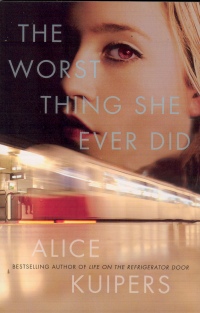| ________________
CM . . .
. Volume XVII Number 15. . . .December 10, 2010 
 |
The Worst Thing She Ever Did.
Alice Kuipers.
Toronto, ON: HarperTrophy Canada, 2010.
210 pp., pbk., $15.99.
ISBN 978-1-55468-020-7.
Subject Headings:
Friendship-Fiction.
Mothers and daughters-Fiction.
Diary fiction.
Grades 9-12 / Ages 14-17.
Review by Jan Sahibzada.
***½ /4
|
| |
|

excerpt:
Mum sighed and said "Sophie," and her voice was gentle.
"What?"
"You have to talk to me."
"I just forgot to go, all right? There's nothing to say."
"What about how we're getting on? Why couldn't you have Easter breakfast with me? We need to talk about that."
"I don't want to talk. I don't want to think. I don't want to remember."
"I know, sweetheart."
"No, you don't. You don't know because you weren't there. You have no idea what it's like, what I see in my head when I close my eyes. Sometimes I'll be in a room, like at a party, and I'll imagine everyone in there being crushed to death."
She pressed her mouth together as if she were physically hurt for me. She said softly, "Tell me more. I want to be here for you."
"It happens when I least expect it; these images come into my head. I don't WANT to go into it. It's never going to get better, and there's nothing you can do. If I hadn't had to tie my STUPID SHOELACE, everything would be different. Don't you understand it's my fault?"
Sixteen-year-old Sophie Baxter's life has changed forever, and all she wants to do is forget. To forget family vacations, time spent watching fireworks, fights, memories captured in photo albums, but most of all to forget that day on the train; the day that no matter what she does haunts her. It's impossible for her to forget especially in the presence of her mother's grief and everyone's questions. Therapy isn't helping much either, and Sophie feels like her therapist, Lynda, is more concerned with pleasing Sophie rather than really helping her. The only good thing Lynda has done was give Sophie a notebook to write in. At first, Sophie isn't sure what to write about, but slowly the words begin to come and the story of what happened that day emerges.
The Worst Thing She Ever Did is a worthwhile read and a book that a wide range of readers will enjoy. Sophie isn't immediately the most likeable protagonist. Her fractured relationship with her mother is understandable, but, at times, Sophie's reluctance to open up to her mother makes it hard to be sympathetic for her. For most of the book, it's also unclear what exactly happened that day and what role Sophie played in anything. This also makes it hard to be completely sympathetic to her in the beginning of the novel. However, as the plot develops, Sophie emerges as not only a victim of a horrible event, but also a regular teen dealing with everyday issues. The use of a diary format is a strength of the novel and the characterization of Sophie. Giving readers access to Sophie's inner thoughts as well as outward reactions helps balance the emotional aspects of the story. Overall, teen readers will identify with Sophie because she is authentic even though she has experienced an extraordinary event.
Kuipers also does a good job building suspense about what actually happened. The suspense is what really keeps the novel engaging. Hints are spread throughout the novel; for example it becomes apparent that what happened that day involved a train and Sophie's refusal to get on the train. The book takes place in London, England, and readers with some knowledge of the terrorist attacks that happened in London's train system a few years back will also pick up on hints that Sophie's sister was a victim. These hints also help lessen the emotional weight when Sophie finally recounts what happened. The title of the book also adds some mystery and does a great deal to add to the intrigue. The title alludes to Sophie's playing some role in the tragedy, and, when the meaning behind the title is finally explained, it is a profound moment in the book.
The only thing missing is some character development of the secondary characters. In the novel, Sophie's best friend, Abigail, develops an eating disorder, but the whole thing feels slightly forced and awkward. The relationship between Sophie and the cute bad boy, Dan, also feels awkward and doesn't necessarily advance the plot. Additionally, the emerging friendship between Sophie and Rosa-Leigh is an important part of Sophie's development, but, at the conclusion of the novel, the friendship feels incomplete. However, these minor flaws don't detract from the strengths of the novel.
It is worth noting that there is some alcohol and drug use mentioned as well as some discussion of sex that makes the book more suitable for an older teen audience. Also, as the novel deals with issues of death and grief, it is aimed at a more mature reader, but will appeal both to male and female readers.
Highly Recommended.
Jan Sahibzada is a Community Outreach Librarian for Calgary Public Library's Forest Lawn branch.

To comment
on this title or this review, send mail to cm@umanitoba.ca.
Copyright © the Manitoba Library Association. Reproduction for personal
use is permitted only if this copyright notice is maintained. Any
other reproduction is prohibited without permission.
NEXT REVIEW |
TABLE OF CONTENTS FOR THIS ISSUE
- December 10, 2010.
AUTHORS |
TITLES |
MEDIA REVIEWS |
PROFILES |
BACK ISSUES |
SEARCH |
CMARCHIVE |
HOME |
